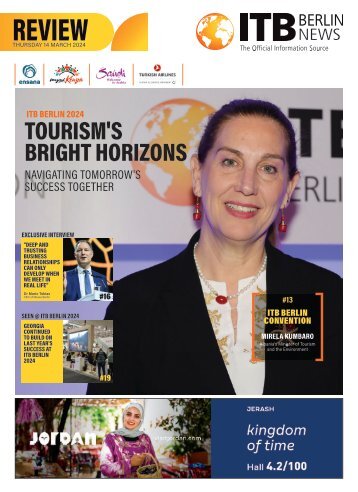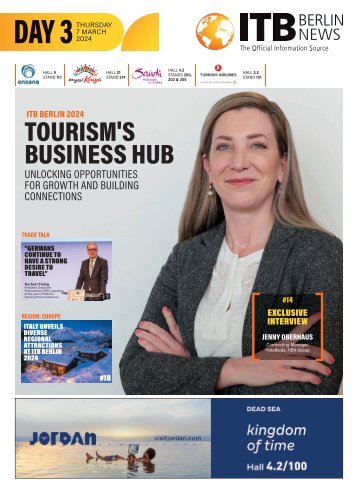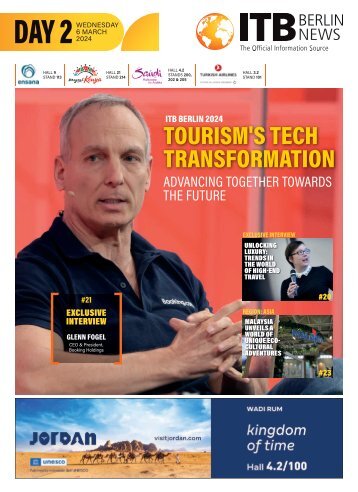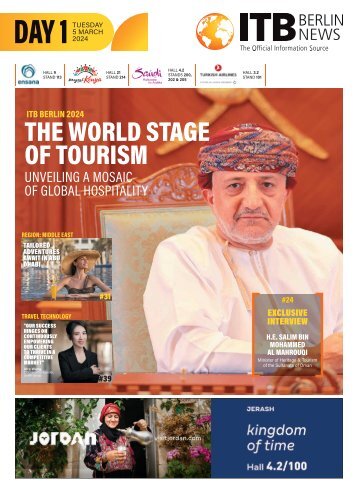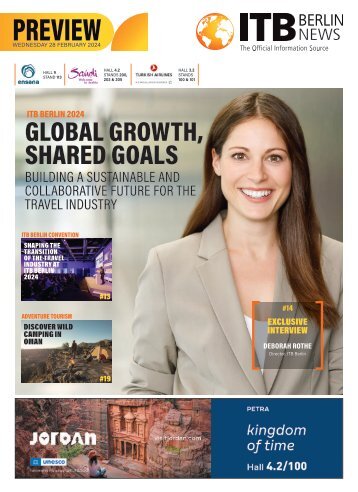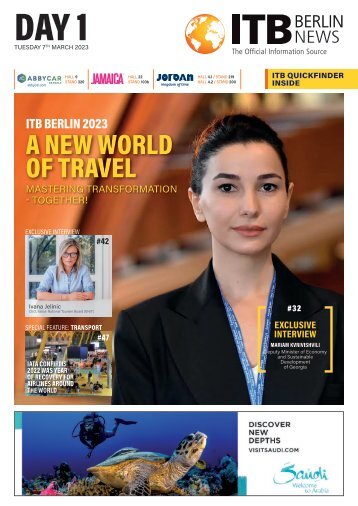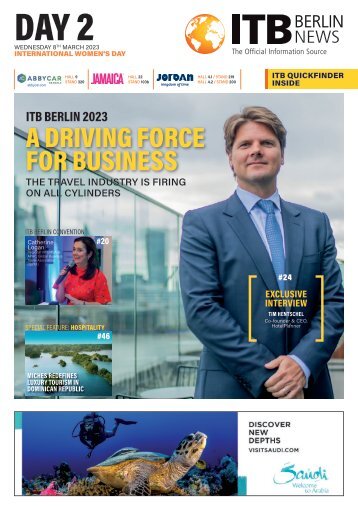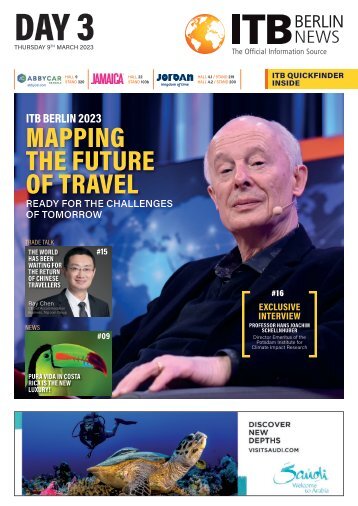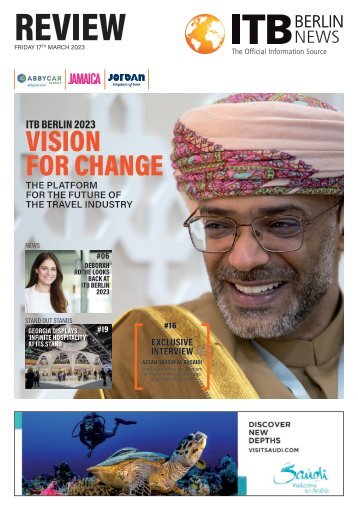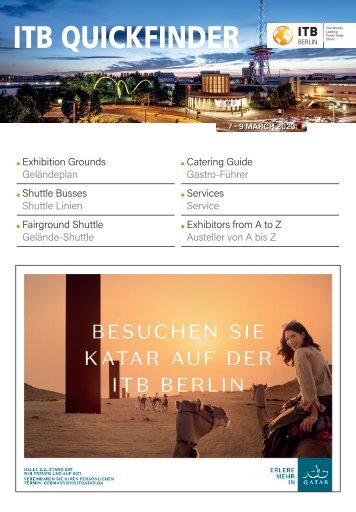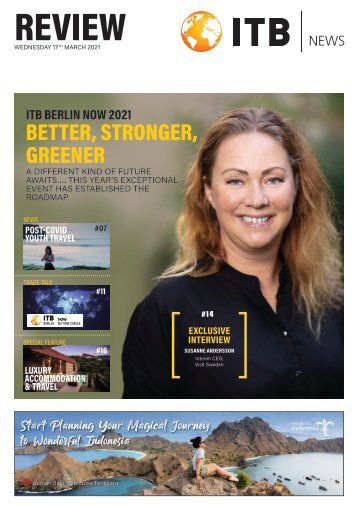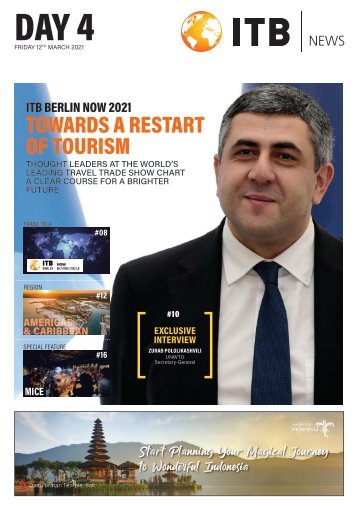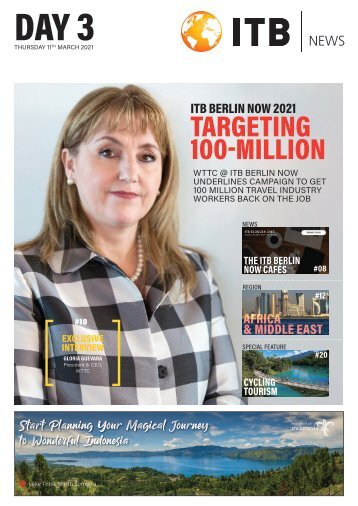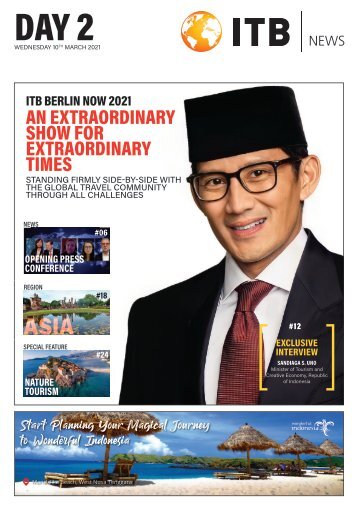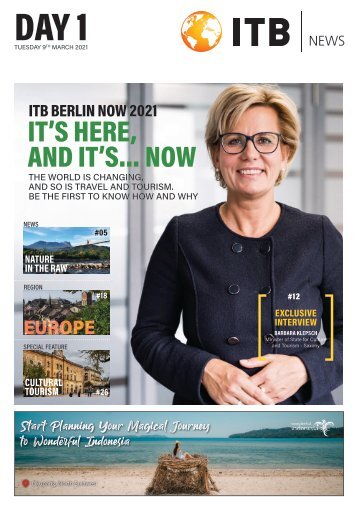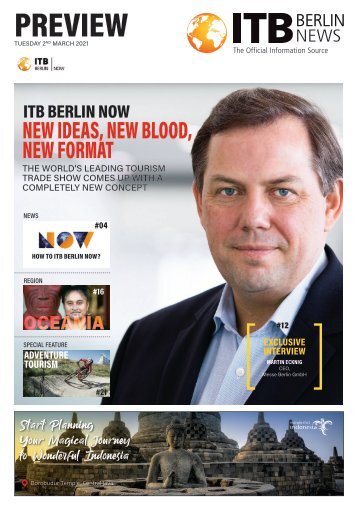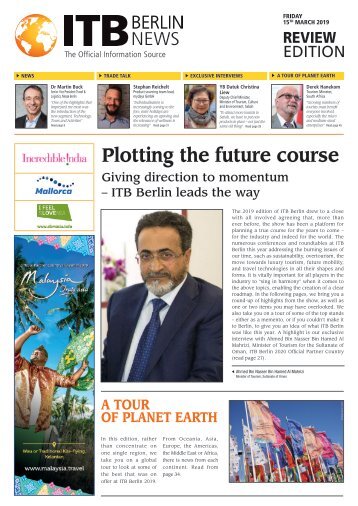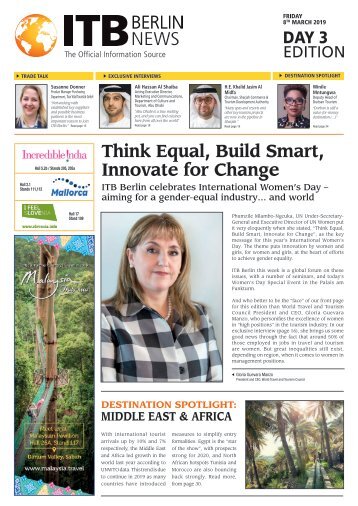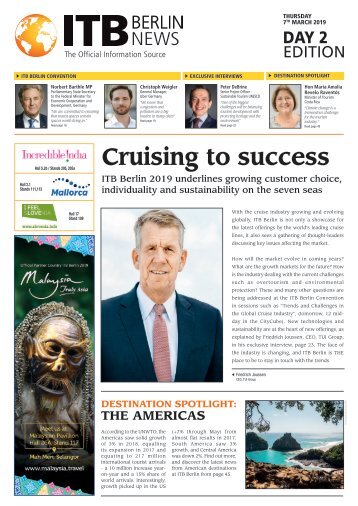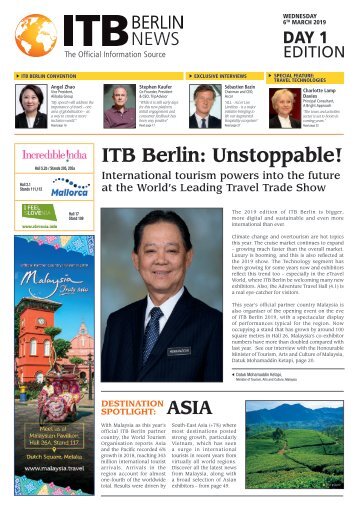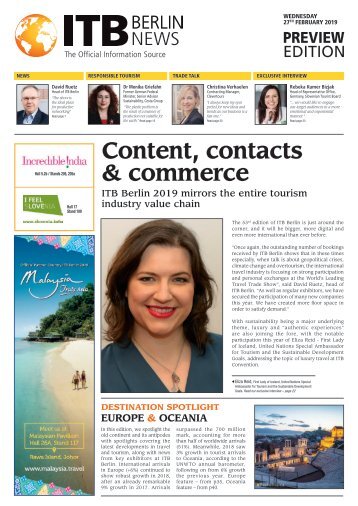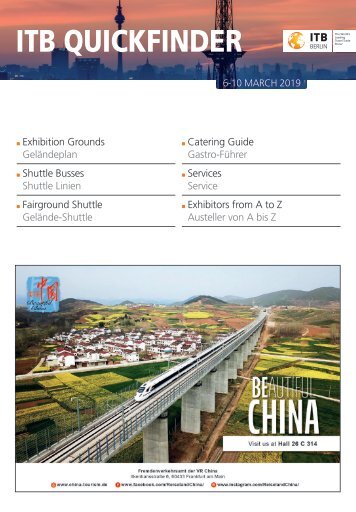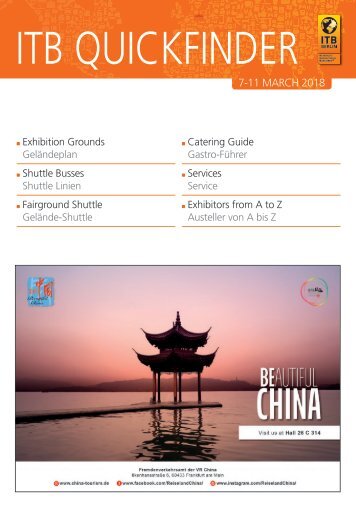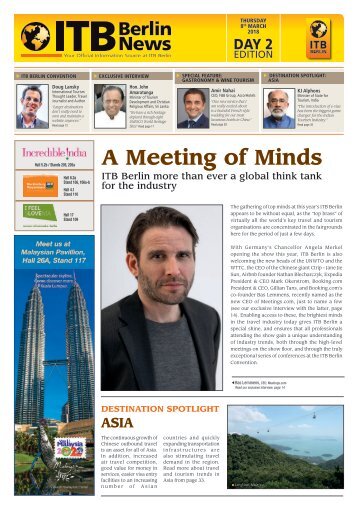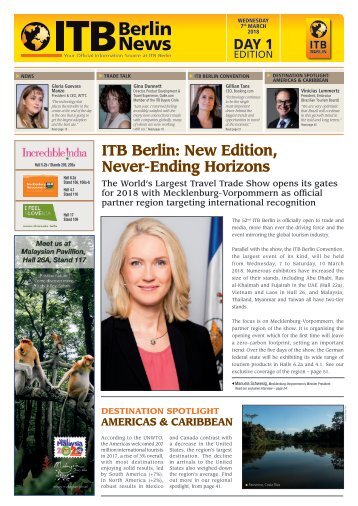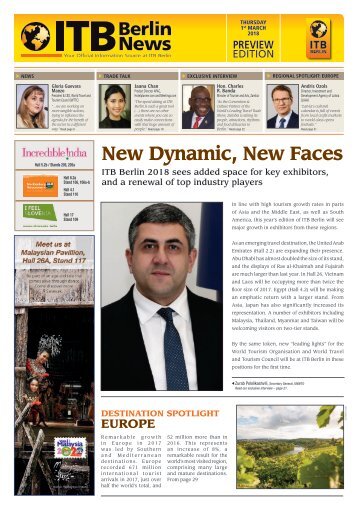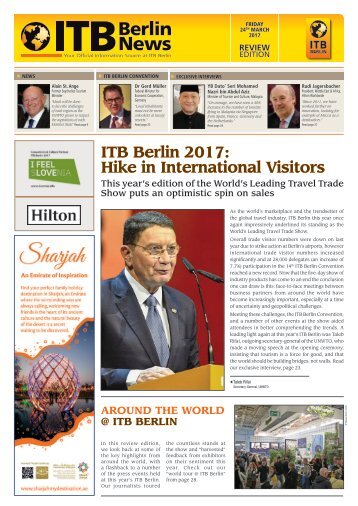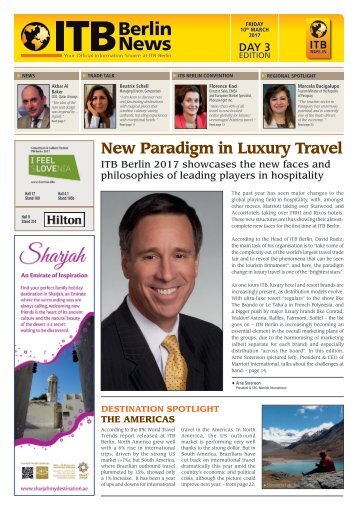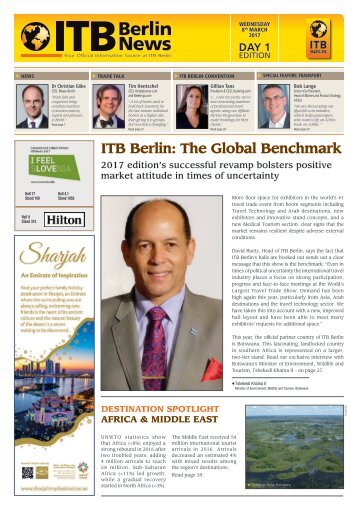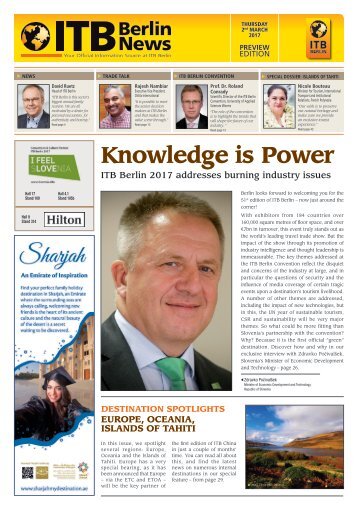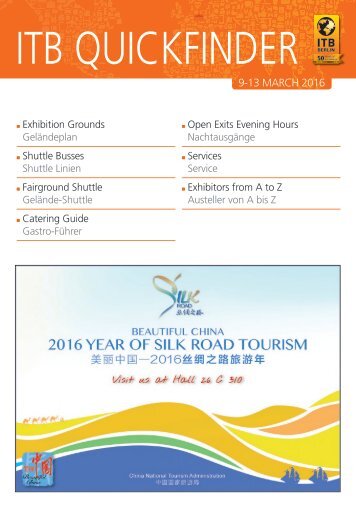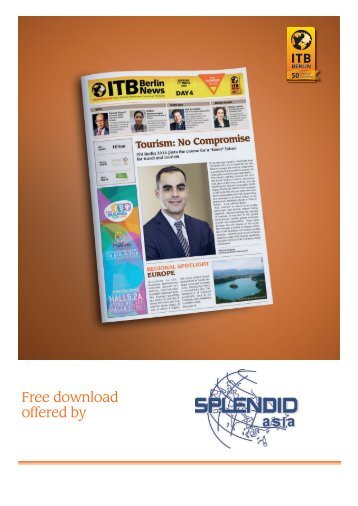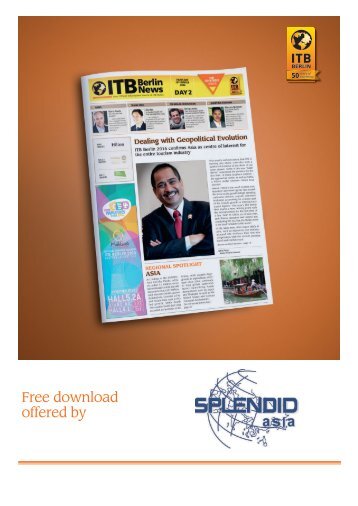
ITB Berlin News - Day 3
- Text
- Hotels
- Tourism
- Tours
- Resort
- Berlin
- Resorts
- Tourismus
- Halle
- Exhibitors
- Aussteller
8 NEWS THE PROS AND CONS
8 NEWS THE PROS AND CONS OF “VOLUNTOURISM” In recent years the new trend of “voluntourism” has become more and more popular as it combines vacation with a shortterm volunteering experience. In particular, projects involving the contact with children such as teaching have become more popular amongst volunteers and are therefore increasingly offered by tour operators. While the emerging commercialization of voluntourism clearly benefits the wishes and needs of paying tourists, the actual benefit for the local community remains unclear. ECPAT Germany and Bread for the World – Tourism Watch today are discussing chances and risks of this emerging new sector at ITB Berlin. Representatives from different fields such as the tourist industry, and NGOs are set to discuss possibilities for a sustainable management of voluntourism, so that the protection of children as well as benefits for the local community can be realised. Within the scope of the discussion ECPAT Germany and Bread for the World – Tourism Watch are to present a new study revealing that child protection measures and the use of development potentials are not yet an implicitness of business for many tour operators in Germany. Furthermore, recommendations for traveller will be given and various requirements for the tourism industry will be discussed. Date: March 6, 2015 Time: 11:00 a.m. - 12:15 p.m. Location: Hall 4.1, Big Stage Hall 4.1 Stand 201 New Discussions on Europe “As a Single Destination” ETC and EC host talks at ITB Berlin aiming to better promote the Continent The European Commission and European Travel Commission (ETC) hosted an essential workshop for European tourism professionals at ITB Berlin. Top ranking tourism officials from across Europe have been meeting to decide a course of action for the joint publicprivate promotion of Europe as a tourist destination. In the past, and to some extent still today, each European country does its own promotion on a global scale, and rightly so, as each has its own very solid identity and culture. But in the knowledge that foreign tourists see Europe as a “single destination”, the ETC has been working over the past years to underline – or highlight – the actions and efforts being made by various receptive organisations to amalgamate and confederate services and offerings across the union in order to make life easier for visitors and indeed for travel professionals planning their itineraries. This week’s workshop gathered together leading public and private tourism stakeholders to discuss a possible roadmap (objectives, roles, types of activities and milestones). Underlining the importance of the discussions, ETC President, Peter De Wilde said, “Europe is one of the strongest travel brands in the world. However, data shows that in this globalized world we live in, Europe is losing market share to other regions of the world. We are working on reinforcing Europe’s position as the number one travel destination by identifying and clearly defining the values of Europe as a destination in order to translate them into pan-European themes and products that are attractive to certain target groups in key markets. Therefore, it would be important to develop a clear definition of a Destination Europe brand, capitalising on Europe’s common values.” WE ARE WORKING ON REINFORCING EUROPE’S POSITION AS THE NUMBER ONE TRAVEL DESTINATION In order to achieve this, Mr De Wilde added that it is crucial for tourism organisations at all levels to continue to strengthen their collaboration under the umbrella of a common European approach and positioning: “I am convinced that we will be able to safeguard Europe’s position as top travel destination, given the unique character of Europe, one to be combined with proper knowledge gathering and sharing and skilfully bringing together private and public efforts.” A panel of high-level representatives of successful publicprivate partnerships promoting internationally major tourist destinations shared their experiences and presented their achievements. The meeting was also the launch pad of the ETC’s new SMARTguide for tour operators and travel agents – primarily outside Europe, aiming to help them with information and ideas for travel planning. The SMARTguide, produced by Cleverdis (publishers of ITB Berlin News), for the ETC, will be a document that tour operators, travel agents and other key players in the industry can “take home” when planning or discussing new ideas for circuits in Europe. It aims to give them an overview of the ongoing Peter De Wilde President, European Travel Commission evolution of Europe’s tourism infrastructure, as well as a number of new ideas and initiatives, which is believed will result in improved planning for better targeted, or more “intelligent” future itineraries. Travelling in Europe SMARTguide ITB BERLIN NEWS • Friday 6 th March 2015 www.itb-berlin-news.com
NEWS 9 Rifai Calls for Industry Support to Quash Poaching The UNWTO Secretary-General says international tourism community must be mobilised UNWTO Secretary- General Taleb Rifai has called upon key players in the tourism industry to help finance antipoaching measures in Africa. Mr Rifai’s statement, issued this week on the occasion of World Wildlife Day, centres on the fact that, according to new UNWTO research, wildlife watching tourism is one of the most important tourism segments in Africa. The UNWTO has issued a statement underlining tourism’s potential in advancing inclusive growth across the continent, and the fact that poaching and illicit trade in wildlife pose a serious threat to the future of Africa’s socioeconomic development, the publication warns. “Given its economic importance, the tourism sector can and should play a key role in raising awareness among both policy makers and tourists on the devastating impacts of wildlife crime, and help finance anti-poaching initiatives”, said Mr Rifai. “UNWTO remains deeply committed to mobilizing the international tourism community on this critical issue, which requires our immediate action.” In support of international efforts to tackle unprecedented levels of poaching and to strengthen the role of tourism vis-àvis wildlife crime, UNWTO is spearheading efforts to increase knowledge on the economic value of wildlife watching in Africa. The study “Towards Measuring the Economic Value of Wildlife Watching Tourism in Africa”, provides a first overview of this segment, its economic impact and the current involvement of tourism in anti-poaching measures. “Poaching is not only destroying precious ecosystems, it also poses a serious threat to socioeconomic development. The loss of biodiversity is directly linked to lost development opportunities in the African tourism sector, which provides livelihoods for millions of people”, said Mr Rifai. UN Secretary-General, Ban Ki-moon said, “Illegal wildlife trade undermines the rule of law and threatens national security; it degrades ecosystems and is a major obstacle to the efforts of rural communities and indigenous peoples striving to sustainably manage their natural resources.” According to UNWTO’s findings, wildlife watching represents 80% of the total annual sales of trips to Africa, with safari as the most popular product. The species most threatened by poaching such as elephants and rhinos, are among the most popular in wildlife watching tours. The research also brings further insights into the economic significance of wildlife watching tourism. Alongside generating crucial income for protected areas through entrance fees, a typical wildlife watching tour costs on average US$ 433 and captures an additional US$ 55 in out-of-pocket expenses per person, per day. In addition, tours often include locally hired services such as accommodation, transportation, tour guides and cultural performances, creating important job opportunities for the local population. Tourism authorities are only involved to a minor extent in anti-poaching efforts and there is room for improvement, the paper indicates. Around 50% of the participating tour operators are funding anti-poaching initiatives and/or engaging in nature conservation projects, however only a few are so far proactively informing and engaging their customers on the issue. In order to advance knowledge of the economic importance of wildlife watching and its potential to directly contribute to conservation efforts, the paper recommends a number of actions for national tourism authorities, including increased involvement in anti-poaching initiatives, systematic integration and evaluation of available data, and capacity building for a more consistent monitoring of protected areas visitors and receipts. Towards Measuring the Economic Value of Wildlife Watching Tourism in Africa builds on a survey of 48 African tourism and conservation authorities from 31 countries, as well as 145 international Taleb Rifai UNWTO Secretary-General and African-based tour operators. The survey has been complemented with available statistics, case study reviews and in-depth interviews with governments and international organisations. TOURISM AUTHORITIES ARE ONLY INVOLVED TO A MINOR EXTENT IN ANTI- POACHING EFFORTS AND THERE IS ROOM FOR IMPROVEMENT Hall 20 Stand 127 ITB BERLIN NEWS • Friday 6 th March 2015
- Page 1: FRIDAY 6 th MARCH 2015 ITB QUICKFIN
- Page 6: 6 NEWS MYSTERIES OF ANCIENT PERSIA
- Page 11 and 12: ITB BERLIN CONVENTION 11 And… ACT
- Page 13 and 14: TRADE TALK 13 MICE on the Rise The
- Page 15 and 16: EXCLUSIVE INTERVIEW 15 Strength in
- Page 17: BUSINESS TRAVEL SPECIAL FEATURE 17
- Page 20: 20 SPECIAL FEATURE GROUP TRAVEL Kin
- Page 24 and 25: 24 SPECIAL FEATURE ADVERTORIAL FAMI
- Page 26 and 27: 26 SPECIAL FEATURE ADVERTORIAL CULT
- Page 28 and 29: 28 SPECIAL FEATURE CULTURAL TOURISM
- Page 31: AFRICA / MIDDLE EAST REGION 31 MAIN
- Page 34 and 35: 34 REGION AFRICA / AFRICA MIDDLE EA
- Page 37 and 38: 37 HOSPITALITY / RESTAURANTS / BARS
- Page 41 and 42: ITB QUICKFINDER 4-8 MARCH 2015 Exhi
- Page 43 and 44: Hall 26 A / Stand 131 Hall 26 A / S
- Page 45 and 46: CATERING GUIDE & OPEN EXITS EVENING
- Page 47 and 48: EXHIBITORS FROM A TO Z AUSTELLER VO
- Page 49 and 50: A / B EXHIBITORS / AUSSTELLER HALL
- Page 51 and 52: B / C EXHIBITORS / AUSSTELLER HALL
- Page 54 and 55: EXHIBITORS FROM A TO Z AUSTELLER VO
- Page 56 and 57: EXHIBITORS FROM A TO Z AUSTELLER VO
- Page 58 and 59:
EXHIBITORS FROM A TO Z AUSTELLER VO
- Page 60 and 61:
EXHIBITORS FROM A TO Z AUSTELLER VO
- Page 62 and 63:
EXHIBITORS FROM A TO Z AUSTELLER VO
- Page 64 and 65:
EXHIBITORS FROM A TO Z AUSTELLER VO
- Page 66 and 67:
EXHIBITORS FROM A TO Z AUSTELLER VO
- Page 68 and 69:
EXHIBITORS FROM A TO Z AUSTELLER VO
- Page 70 and 71:
EXHIBITORS FROM A TO Z AUSTELLER VO
- Page 72:
EXHIBITORS FROM A TO Z AUSTELLER VO
Inappropriate
Loading...
Mail this publication
Loading...
Embed
Loading...
